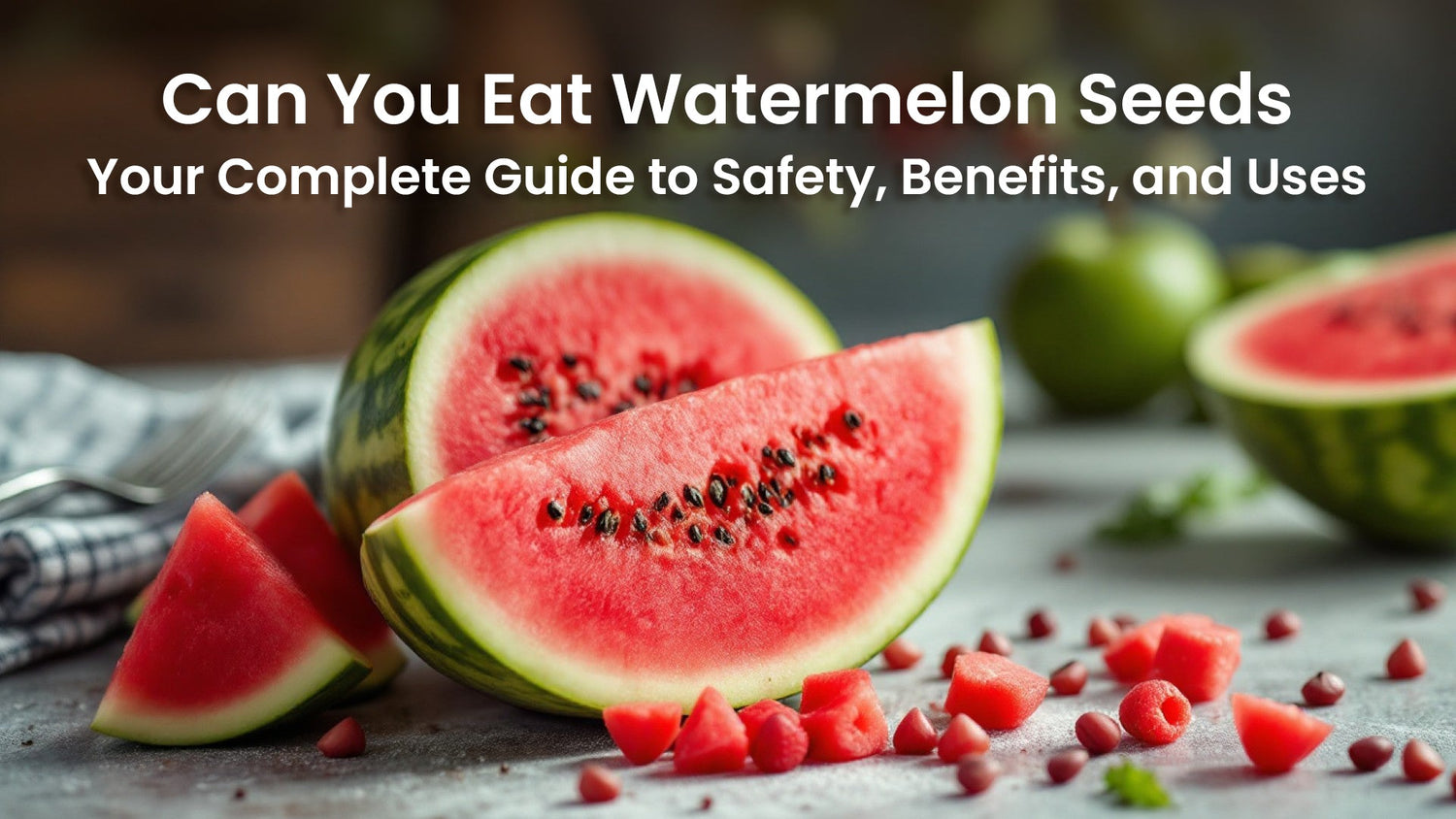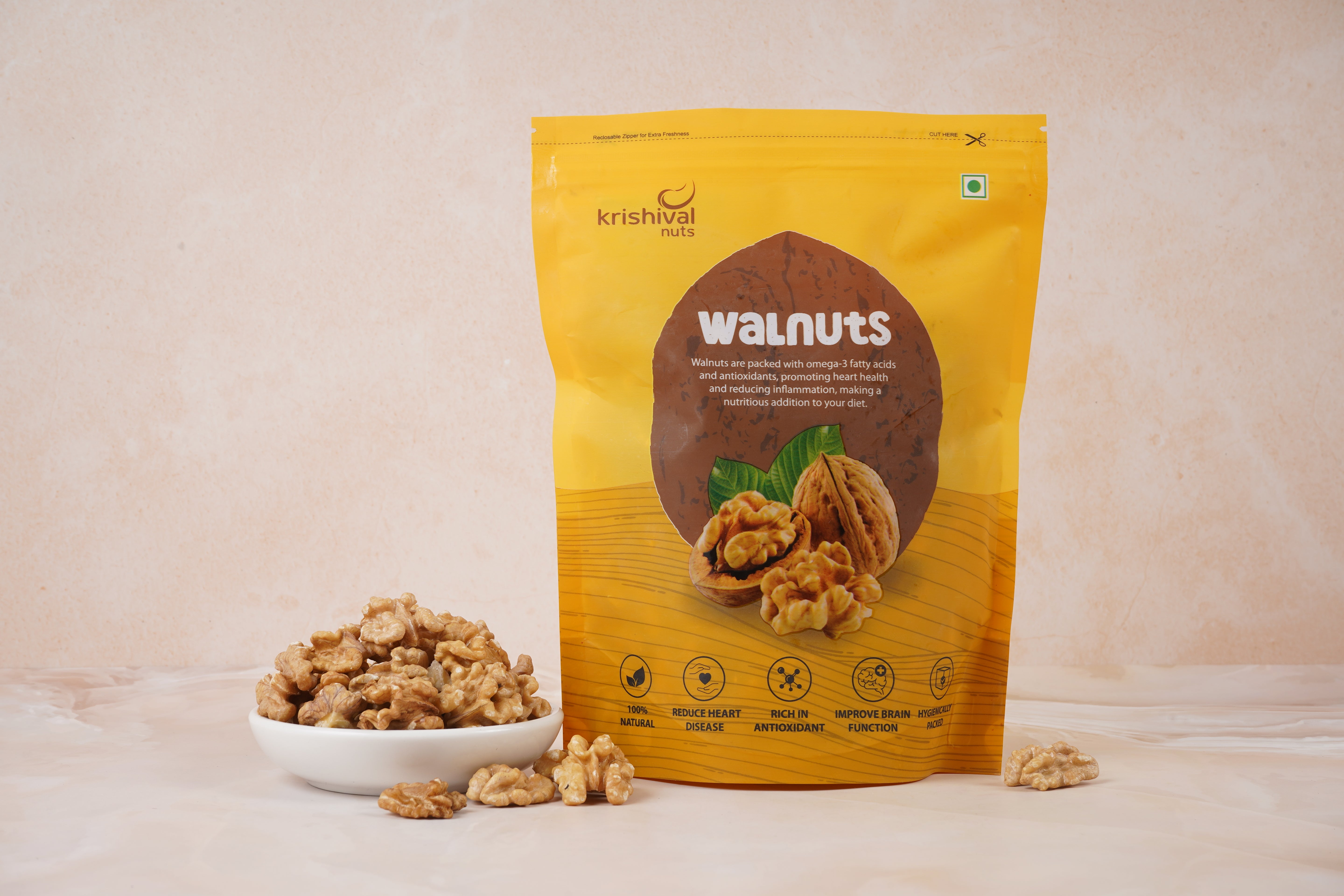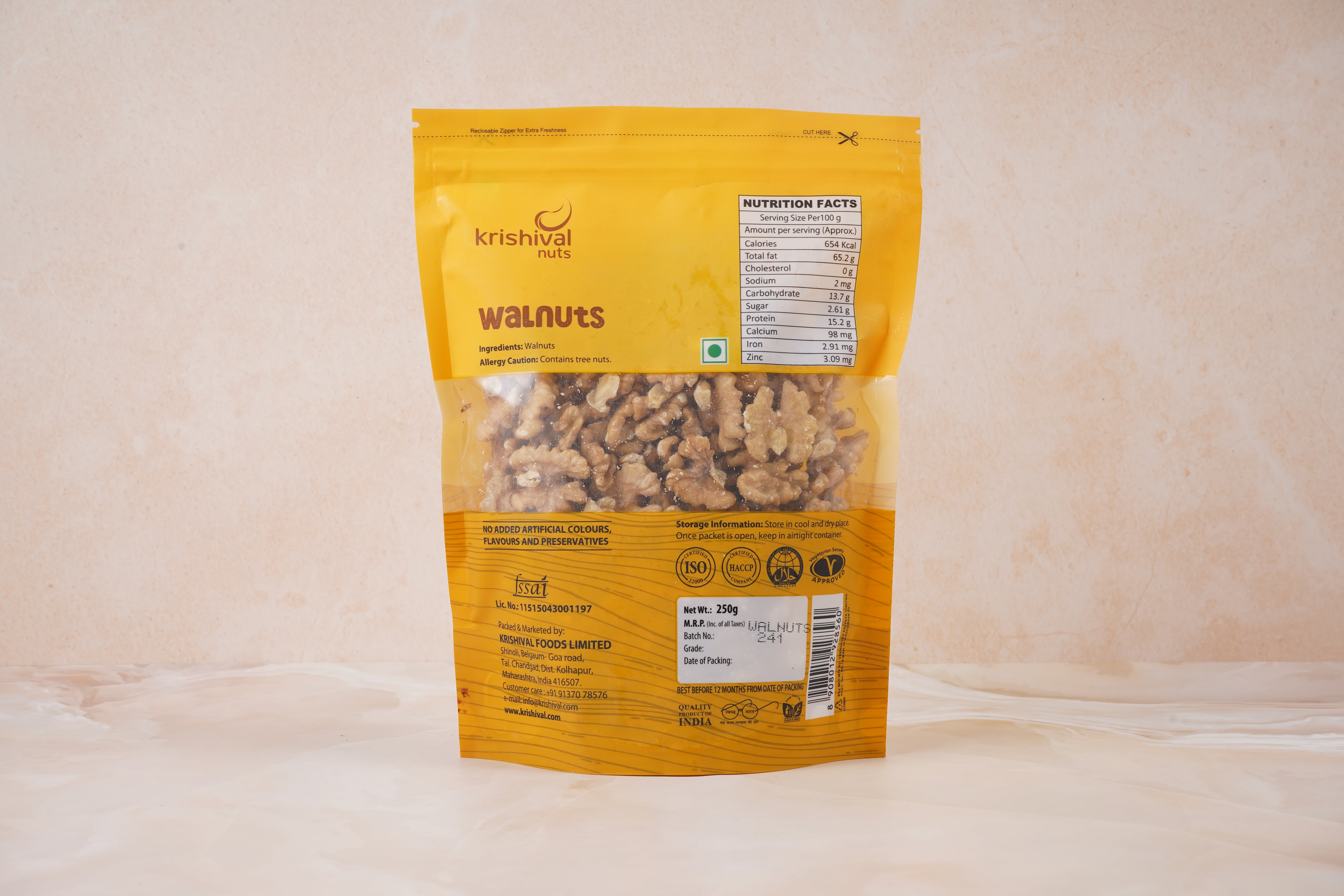Can You Eat Watermelon Seeds? Your Complete Guide to Safety, Benefits, and Uses
Many people remember being told as children that swallowing watermelon seeds would cause a watermelon to grow in their stomach. Can you eat watermelon seeds? Yes, you absolutely can. Eating watermelon seeds is generally safe, and they can even be quite nutritious. This article will explore the safety of eating watermelon seeds, their nutritional value, potential health benefits, possible risks, and different ways you can prepare and eat them. Last Updated: May 2025.
Yes, You Can Eat Watermelon Seeds! Here's Why They're Safe
It is safe to eat watermelon seeds, whether they are black or white. Black watermelon seeds are the mature, fertile seeds that could grow into a new watermelon plant if you planted them. White "seeds" often found in seedless watermelons are typically just empty seed coats that didn't fully mature; these are also safe to consume. When you swallow raw, whole watermelon seeds, they mostly pass through your digestive system as insoluble fiber. Registered dietitian Toby Amidor confirms that both types of seeds are safe to eat. Exploring the nutritional power of seeds reveals that many types, including watermelon seeds, can be a healthy part of your diet.
Unpacking the Nutrition: Vitamins and Minerals in Watermelon Seeds
Watermelon seed nutrition is quite impressive, as they are packed with several important vitamins and minerals. Watermelon seeds offer protein, fiber, magnesium, iron, and zinc. They also provide healthy fats, including monounsaturated and polyunsaturated fats. B vitamins like folate and niacin are also present. Regarding the calories in watermelon seeds, an ounce (about 28 grams) of watermelon seed kernels contains approximately 158 calories. For example, that same ounce offers about 8 grams of protein and around 146 milligrams of magnesium. You can find detailed nutritional information for watermelon seeds on resources like the USDA FoodData Central. The general health benefits of seeds often stem from this dense nutrient profile.
More Than Just a Snack: Potential Health Benefits of Watermelon Seeds
The benefits of eating watermelon seeds come from their rich nutrient content, making them good for you in several ways. The healthy fats and magnesium in watermelon seeds contribute to heart health; these fats can help lower "bad" cholesterol, while magnesium plays a role in regulating blood pressure. The fiber content aids digestion. Zinc and iron support a healthy immune system. Magnesium is also crucial for bone health and may help regulate blood sugar levels. Some nutrients in watermelon seeds can also promote healthy skin and hair. Magnesium, in particular, is involved in over 300 enzymatic reactions in the body. Research indicates that healthy fats are beneficial for lowering LDL cholesterol. The role of magnesium in health is extensive and well-documented.
Preparing and Enjoying Watermelon Seeds: Tips and Ideas
Learning how to eat watermelon seeds can open up new snack possibilities, from raw to roasted. Eating raw watermelon seeds provides insoluble fiber, though some may find them hard to chew or digest. Roasting watermelon seeds improves their taste and texture, making them easier to digest. To roast them, toss clean, dry seeds with a little olive oil and salt (or other seasonings like cinnamon sugar) and bake on a baking sheet at 325°F (160°C) for about 15-20 minutes, stirring halfway through. Sprouted watermelon seeds are another option; sprouting can increase nutrient availability and make them easier to digest. You can also find watermelon seeds ground into flour or made into seed butter. These preparations offer versatile ways to enjoy watermelon seed recipes and make them a great addition to healthy snack ideas.
Things to Keep in Mind: Potential Risks of Eating Watermelon Seeds
While generally safe, there are a few watermelon seeds side effects or risks of eating watermelon seeds to consider. The high fiber content in watermelon seeds might lead to digestive issues like gas, bloating, or constipation if you eat too many, especially if your system isn't used to a lot of fiber. Because they contain healthy fats, watermelon seeds are calorie-dense, so practicing portion control is important if you're watching your calorie intake. For very young children, whole seeds could be a choking hazard, so it's wise to be cautious. Also, if you buy pre-packaged roasted watermelon seeds, check the label for high levels of added sodium or sugar. It's always a good idea to start with a small amount if you're new to eating them to see how your body reacts. Understanding the importance of dietary fiber can help you incorporate them into your diet sensibly.
Black or White: Does the Color of Watermelon Seeds Matter?
When considering black vs white watermelon seeds, it's important to know that both types are edible. The difference between black and white watermelon seeds is primarily their stage of maturity. Black watermelon seeds are fully mature and fertile. White watermelon seeds, often found in "seedless" varieties, are usually just empty seed coats that haven't fully developed. While black seeds might be slightly more nutrient-dense because they are fully formed, the nutritional differences are often negligible for casual eating. Many find that white watermelon seeds are softer and easier to chew.
Beyond Snacking: Watermelon Seeds and Food Sustainability
Watermelon seeds sustainability is an interesting aspect to consider. Using the entire watermelon, including the seeds and even the watermelon rind, helps to reduce food waste. This practice of whole fruit utilization aligns perfectly with sustainable food consumption and contributes to a more circular economy by reducing agricultural waste. Embracing zero waste watermelon practices is a small step that can have a positive environmental impact. You can find many tips for reducing food waste that complement this approach.
The Bottom Line: Should You Eat Watermelon Seeds?
So, what's the eating watermelon seeds verdict? Watermelon seeds are safe to eat, surprisingly nutritious, and can be a healthy and tasty addition to your diet when you prepare them properly and consume them in moderation. The key health benefits, such as their contribution of magnesium, protein, and healthy fats, make them a worthwhile snack. Roasting them is an easy and popular way to enjoy their crunchy texture and nutty flavor. Feel free to explore healthy food products that might include these nutritious seeds.
Frequently Asked Questions About Eating Watermelon Seeds
Here are answers to some common questions about eating watermelon seeds:
Q1: Can you eat watermelon seeds everyday?
A: Yes, you can eat watermelon seeds every day as part of a balanced diet, but do so in moderation due to their calorie and fiber content.
Q2: Do watermelon seeds make you constipated?
A: Eating too many watermelon seeds could potentially cause constipation or other digestive discomfort for some people due to their high fiber content. However, in moderation, the fiber usually aids digestion.
Q3: What's the healthiest way to eat watermelon seeds?
A: Sprouted or roasted watermelon seeds are often considered the healthiest ways to eat them because these methods can improve digestibility and nutrient absorption. Opt for preparations without excessive salt or sugar.
Q4: Can kids eat watermelon seeds?
A: Yes, kids can eat watermelon seeds. However, for very young children, whole seeds might pose a choking hazard, so it's best to be careful or offer them in a ground or butter form.
Q5: Are watermelon seeds safe to eat raw, or do they need to be prepared in a certain way for consumption?
Yes, watermelon seeds are safe to eat raw, but they are often more enjoyable and digestible when roasted. Roasting them enhances their flavor and crunch, making them a popular snack. You can also soak them to improve their texture and ease of digestion.
Q6: What nutritional benefits do watermelon seeds offer, and how do they compare to other seeds like pumpkin or sunflower?
Watermelon seeds are rich in protein, healthy fats (especially polyunsaturated fats), fiber, and essential minerals like magnesium, zinc, and iron. While pumpkin and sunflower seeds are also nutrient-dense, watermelon seeds are lower in fat and calories, offering a lighter, high-protein option with similar health benefits.
Q7: How do watermelon seeds contribute to digestive health, and what role do they play in preventing common digestive issues?
Watermelon seeds are an excellent source of fiber, which helps regulate bowel movements and prevent constipation. Their fiber also acts as a prebiotic, feeding beneficial gut bacteria, promoting a healthy gut microbiome, and supporting overall digestive function.
Q8: Can eating watermelon seeds support heart health, and what specific nutrients in them promote cardiovascular function?
Yes, watermelon seeds can support heart health due to their high content of magnesium, unsaturated fats, and antioxidants. Magnesium helps regulate blood pressure and supports normal heart rhythm, while the healthy fats contribute to lower cholesterol levels, reducing the risk of heart disease.
Q9: How do watermelon seeds help in boosting energy levels, and why are they a great snack for athletes or active individuals?
Watermelon seeds are a great source of plant-based protein, healthy fats, and carbohydrates, making them an excellent energy-boosting snack. The protein helps with muscle repair, the healthy fats provide sustained energy, and the carbohydrates replenish glycogen stores after exercise, making them ideal for athletes or anyone needing an energy boost.
Q10: Can watermelon seeds help regulate blood sugar levels, and are they a good choice for people with diabetes?
Yes, watermelon seeds have a low glycemic index and contain magnesium, which helps improve insulin sensitivity and regulate blood sugar levels. Their fiber content also slows the absorption of sugar into the bloodstream, making them a beneficial snack for individuals with diabetes or those looking to maintain stable blood sugar levels.
Q11: What antioxidants are found in watermelon seeds, and how do they help reduce oxidative stress and protect the body from disease?
Watermelon seeds contain antioxidants like vitamin E, carotenoids, and phenolic compounds, which help neutralize free radicals in the body. These antioxidants reduce oxidative stress, protect cells from damage, and lower the risk of chronic diseases such as cancer, cardiovascular disease, and age-related degeneration.
Q12: How do watermelon seeds benefit skin health, and can they help reduce signs of aging or improve complexion?
Watermelon seeds are rich in vitamin E, an antioxidant known for its skin benefits. Vitamin E helps protect the skin from UV damage, prevents wrinkles, and promotes skin elasticity. The healthy fats in watermelon seeds also help hydrate the skin, improving its appearance and texture.
Q13: Can watermelon seeds assist in weight management, and how do they support fat burning and metabolism?
Watermelon seeds are high in protein and fiber, which contribute to satiety and help control appetite. The healthy fats in these seeds support metabolism by increasing fat burning. As part of a balanced diet, watermelon seeds can aid in weight management by providing a nutrient-dense, satisfying snack.
Q14: Are there any potential side effects or risks of consuming watermelon seeds, especially in large quantities?
While watermelon seeds are generally safe to eat, consuming them in large quantities may lead to digestive discomfort due to their high fiber content. Additionally, they are calorie-dense, so overeating can contribute to excess calorie intake. It's best to enjoy them in moderation as part of a balanced diet.
Q15: What are some creative ways to incorporate watermelon seeds into your diet, and how can they be used in cooking and baking?
Watermelon seeds can be roasted with spices and eaten as a snack, or they can be sprinkled on salads, soups, or yogurt for added crunch. You can also grind them into a powder and use it in smoothies, energy bars, or baked goods like muffins and cookies. Adding them to granola or homemade trail mix is another creative way to enjoy their benefits.









